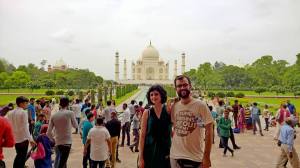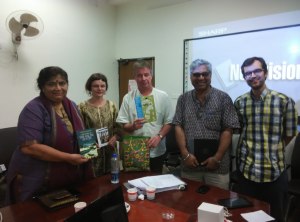
When I thought about how to write about my stay in India I remembered what a friend of mine said – you can read all about India on blogs, in travel guides, talk to people who already been there; but in the end nothing can prepare you for that experience. I find this to be completely true. Coming from Croatia, a country of 4.5 million people, to Delhi, a city of 18 million, would require an adjustment by itself, not to mention the hectic traffic, the heat and the multitude of stimuli all around. I was lucky to have found a nice apartment near Jawaharlal Nehru University (JNU). My flat was situated in Munirka, a nice and easy-going neighborhood.

JNU has a beautiful campus and walking around it feels like walking in a forest which happens to have a few buildings and roads in it. Professors Aditya and Mridula Mukherjee were kind hosts, as well as their PhD students who welcomed me as one of their own. I attended their meetings, gave and received valuable insights about their and my work. My work mainly took place at the campus library or at the library of Nehru Memorial.
I did some traveling around with my wife and friends – first timers in India should definitely visit the golden triangle; Jaipur, Varanasi and Agra. Those towns are filled with so much color, lovely sights, excellent food and beautiful parks; I would say this about Delhi as well.
I learned a lot about India’s history and culture, but also about its political struggles and cultural traumas. The complex historical relationship with United Kingdom and especially with Pakistan have shaped much of today’s political issues and positions. Despite its turbulent history and the great number of differences within the society, India feels like a stable, healthy democracy. I think this is due to the basis of the modern country’s creation, in the thought of Gandhi and Nehru, especially in their non-violent approach.
The major problem in India comes from the great number of people living in poverty and with low prospects for upward social mobility. Despite this, people in India seem to be happy, always eager to help a stranger out. Their curiosity about your background (especially if you are coming from former Yugoslavia) is only matched by their kindness and willingness to make you feel a part of their family.
Working for the SPECTRESS project gave me an opportunity to get to know India, have a productive time and gain insights into processes of cultural traumas. I enjoyed my time in Delhi and I am looking forward to going back!
